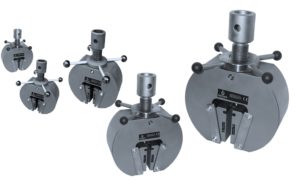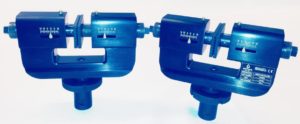
Sophia High Tech provides a wide range of tensile wedge grips to perform your testing. Elevated and reduced temperature tensile test procedures are available.
Tensile tests measure the force required to break a plastic sample specimen and the extent to which the specimen stretches or elongates to that breaking point. Such tests produce stress-strain diagrams used to determine tensile modulus. The resulting test data can help specify optimal materials, design parts to withstand application forces, and provide key quality control checks for materials.
Tensile Properties of Polymer Matrix Composite Materials
ASTM D3039
Specimens are placed in the grips of a Universal Test Machine at a specified grip separation and pulled until failure. For ASTM D3039 the test speed can be determined by the material specification or time to failure (1 to 10 minutes). A typical test speed for standard test specimens is 2 mm/min (0.05 in/min). An extensometer or strain gauge is used to determine elongation and tensile modulus. Depending upon the reinforcement and type, testing in more than one orientation may be necessary.
Tensile Properties of Plastics
ASTM D638
Specimens are placed in the grips of the universal tester at a specified grip separation and pulled until failure. For ASTM D 638 the test speed is determined by the material specification. An extensometer is used to determine elongation and tensile modulus.
Flatwise Tensile Strength of Sandwich Constructions
ASTM C297
Test specimens are cut from sandwich panels, and the faces of the test specimens are bonded to aluminum blocks. The adhesive must then be allowed the appropriate conditioning before testing. One of the aluminum blocks is mounted in a fixture on the stationary side of a universal test machine, while the opposite aluminum block is mounted in a fixture on the moving side of the universal test machine. The assembly is then pulled apart at the suggested standard head displacement speed of 0.50 mm/min (0.020 in/min) to failure, or at a speed set to produce failure within 3 to 6 minutes. Failure between an aluminum block and the sandwich structure is not an acceptable failure mode.
Open-Hole Tensile Strength of Polymer Matrix Composite Laminates
ASTM D5766
Test specimens are placed in the grips of a universal tester at a specified grip separation and pulled until failure. The test specimens and test protocol are as called out in ASTM D3039 for Tensile Properties of Composite Materials. A typical test speed for standard test specimens is 2 mm/min. Depending upon the reinforcement and type, testing in more than one orientation may be necessary.
Tensile Properties of Reinforced Thermosetting Plastics Using Straight-Sided Specimens
ASTM D5083
Specimens are placed in the grips of a Universal Test Machine at a specified grip separation and pulled until failure. For ASTM D5083 the test speed may be determined by the material specification. The default test speed is 5 mm/min (0.2 in/min), but modulus determinations may be made at 2 mm/min (0.079 in/min). An extensometer or strain gauge is used to determine elongation and tensile modulus. Depending upon the reinforcement and type, testing in more than one orientation may be necessary.
Tensile Properties of Plastics by Use of Microtensile Specimens
ASTM D1708
Specimens are placed in the grips of the Universal Test Machine at a specified grip separation and pulled until failure. For ASTM D1708 the test speed is approximately 1/4 of the test speed that would be used for ASTM D638. No extensometer is used, and tensile modulus is not measured
Tensile Properties of Thin Plastic Sheeting
ASTM D882
Specimens are placed in the grips of the Universal Tester and pulled until failure. For ASTM D882 the test speed and grip separation are based on the elongation to break of the material. Elongation and tensile modulus can be calculated from crosshead displacement, or with an extensometer
Vulcanized Rubber and Thermoplastic Elastomers—Tension
ASTM D412
This method covers the effect of the application of a tension load to vulcanized rubber and similar rubber-like material at room temperature and elevate temperature. Covered are tests for tensile stress, tensile strength, ultimate elongation and set. The method is not applicable to the testing of material ordinarily classified as ebonite or hard rubber.
Tensile-Impact Energy to Break Plastics and Electrical Insulating Materials
ASTM D1822
The thickness and width of the test specimen is recorded. The specimen is then clamped to the crosshead and placed into the pendulum. The pendulum is released and allowed to strike the anvil breaking the specimen. The tensile impact energy is recorded and then corrected impact energy is calculated.
The basic types of mechanical wedge grips are two. In both cases the gripping members move and wedges remain stationary while it is clamped on the sample, or wedges move tightening the sample and bodies of the handles remain stationary. Because the wedges do not move in the axial direction with respect to the model during clamping, wedge clamps “standard”, they do not have the potential to put the tensile sample in compression, possibly damaging it as they are tightened. However, the “simple” wedge grips, are shorter in all length and for this reason better able to fit into confined space. They are slightly easier to fabricate and thus are slightly less expensive.
In the grips made by Sòphia High Tech, the body moves upwards. The jaws move only horizontally. The main gripping force is generated during the test by wedging action.

| WEDGE GRIP Type | Capacity [kN] | Dimension [mm] | Temperature range [°C] | Weight [kg] (grip with jaw) | |||
| A | B | C | D | ||||
| SHT-WG-20 | 20 | 140 | 40 | 152 | 52 | 0-130 | 5,5 |
| SHT-WG-50 | 50 | 285 | 80 | 198 | 66 | 0-130 | 17 |
| SHT-WG-100 | 100 | 370 | 100 | 310 | 95 | 0-130 | 48 |
| SHT-WG-150 | 150 | 370 | 100 | 310 | 95 | 0-130 | 48 |


